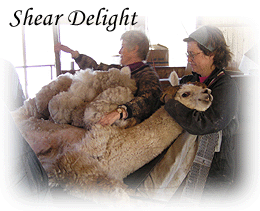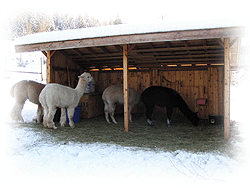|
Frequently
Asked Questions About Alpacas
Q. Where do Alpacas come from?
Alpacas are indigenous to the High Andes Mountains of the South American countries of Peru, Bolivia, and Chile. Alpacas were a cherished treasure of the ancient Inca civilization and played a central role in the Incan culture. Alpacas have been domesticated for over 5,000 years and their cashmere-like fleece, once reserved for Incan royalty, has been highly prized by the artisan markets of hand spinners, weavers, and knitters, the fashion houses around the world, as well as the textile makers of Canada, Europe, and Japan. Local alpaca fibre is also being sold at the farm gate by producers as well as on the Internet. Various worsted and woolen mills in western Canada offer custom processing of alpaca fibre such as carding, blending, dyeing, and processing into spun yarn, rovings, batts, felt, fabric as well as a variety of end products. Our national herd in Canada now numbers over 18,000. As the future unfolds, alpacas and their beautiful fleece will take their place at the head of specialty fibre industries world wide.
Q. What do you do with an Alpaca?
Alpacas provide an excellent investment opportunity and are the source of luxurious fibre which is an annual cash crop. The fleece, comparable to cashmere, is known for its fineness, light weight, lustre, and insulating quality, which is seven times that of wool! Those who cannot wear sheep’s wool can usually comfortably wear Alpaca as there is an absence of much of the prickle factor and lanolin found in sheep’s wool. With the exception of mohair, Alpacas produce the strongest animal fibre in the world. Alpacas are the only animal in the world that come in 22 natural colours! Alpacas are also used for breeding stock, companion animals, and pet therapy.
 Q. How is Alpaca fibre harvested? Q. How is Alpaca fibre harvested?
Alpacas are shorn annually in the spring. The best fleece comes from the blanket (back, side shoulder, and rump). The first baby clip commands a premium because of its extra fineness. Shearing is done with conventional sheep-shearing equipment.
Q. What is their personality like?
As a rule, Alpacas are gentle and easy to handle. They are amazingly alert animals who quickly learn to halter and lead. They constantly communicate with each other through body posture, tail and ear movements, and a variety of sounds which most often is a soft humming. They can be easily transported long distances in vans, trailers, or trucks. They rarely kick or spit unless provoked. Being social animals, they are very safe and calm around children.
 Q. Are Alpacas easy to care for? Q. Are Alpacas easy to care for?
Alpacas are ideally suited to small acreage. Instead of hooves, they have soft padded feet making them gentle on the land and environmentally friendly. Although Alpacas eat pasture close to the ground, they do not tear or damage the plants as do some livestock. They prefer browsing in open pastures with fresh water always available. Alpacas are small and easy to maintain and require no extraordinary care. They should have basic three sided shelters for protection against heat and foul weather. They do not need challenging fences which are needed more to keep predators out than to keep alpacas in. They require shearing, de-worming, toenail trimming, and vaccinations. Alpacas are very clean and tend to be highly disease resistant. They have a habit of defecating in fixed areas and avoid grazing around dung piles, thus parasite infestation is less probable than other livestock. They adapt well to most climates, altitudes and conditions.
Q. What are the financial returns?
You can diversify your investment portfolio with attractive tax advantages such as farm status, expense deductions, depreciation, and the deferred recognition of accumulating wealth. The luxurious alpaca fibre provides an annual cash crop. The North American Alpaca industry will remain focused on breeding stock for many years due to the slow reproductive rate, import restrictions, and current demand of a rapidly growing industry. Alpacas are truly the world’s finest livestock investment!
|